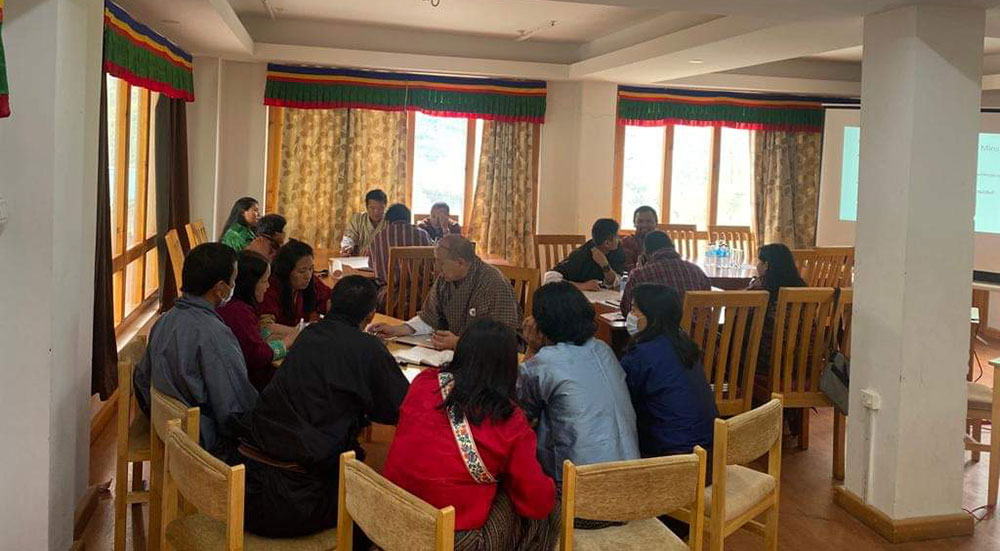Sherab Lhamo
On August 26, at Paro College of Education (PCE), a review meeting was convened concerning the three-year-long pilot project named “Multi-Country Study on Educational Innovations for Out of School Children (OOSC) and Children at Risk of Dropping Out.”
The objective of this initiative is to engage OOSC with Disabilities and prepare them for an independent future by ensuring their continued education.
The meeting aimed to provide updates on the progress made by implementing partners, including Changangkha Middle Secondary School, Yangchen Gatshel Higher Secondary School, Ability Bhutan Society (ABS), and Volunteer Teachers of Bhutan (VTOB) in the Thimphu district.
These partners have been working to offer intervention programs and resources tailored to the needs of OOSC with disabilities.
Commencing in March 2021, this three-year pilot project is scheduled to conclude in November 2023.
The project involves Special Educational Needs (SEN) teachers from two schools and SEN facilitators in two other centers who are providing customised intervention programmes to approximately 20 out-of-school and at-risk children with disabilities.
Additionally, three researchers from PCE are actively engaged in evaluating the effectiveness of these intervention programmes by collecting data from parents, principals, teachers, facilitators, and programme officers.
At Yangchen Gatshel Higher Secondary School, four students participated in the project, focusing on basic functional literacy and numeracy, life skills, and Activities for Daily Living Skills (ADLS). These daily life skills include personal hygiene, dressing, speech, and language.
Sonam Wangdi, the SEN coordinator at Yangchen Gatshel school, mentioned that on October 1, the project introduced vocational skills training, such as laundry, bakery, sewing, and car wash services conducted by disabled students.
This initiative has not only encouraged students to attend school but has also allowed them to learn and earn income simultaneously.
The Knowledge and Innovation Exchange (KIE) International Development Research Centre (IDRC) in Canada provided financial support for this endeavor, enabling the purchase of essential materials and resources like baking ovens, washing machines, sewing machines, and more.
PCE has also conducted action-oriented research meetings, which involve a research method aimed at generating knowledge, evaluating practices, and resolving existing issues concerning OOSC and Children at Risk of Dropping Out through collaborative university-to-community interventions.
Dr Karma Jigyel (PhD), assistant professor at PCE, highlighted common challenges reported by implementing partners.
These include the difficulty in handling children affected by multiple disabilities due to a lack of experts to provide the necessary support, low economic status of parents and caregivers hindering transportation of their children to and from school, and time management issues.
The latter arises because parents prioritize economic activities, leading to irregular attendance during intervention programs for their children with disabilities. Dr Karma said that a major challenge lies in the lack of parental support and frequent absenteeism among the children.
The three-year joint pilot project encompasses three countries—Bangladesh, Bhutan, and Nepal, with support from KIE IDRC in Canada. Each country has a specific focus, and for Bhutan, PCE has concentrated on out-of-school and at-risk children with disabilities.
Rinchen Yangdon, the SEN teacher of Changangkha school, shared that they have five students enrolled in the project. The students are taught to identify different currencies, learn calculation techniques related to purchasing and receiving change. The schools also emphasise fine motor skills, behavior management, basic literacy and numeracy, and even cooking skills to empower these students to take care of themselves.
PCE offers support to implementing partners through grants from KIE ICRD in Canada.
Changangkha school in Thimphu assists in training VTOB facilitators in handling child behavioural disorders and appropriate therapy interventions, thereby enhancing their capacity to support individuals with disabilities participating in programmes.
Although the school does not provide IT-related programs for individuals with disabilities, VTOB accommodates students at risk of dropping out in day programs that complement the offerings of Changangkha school, fostering collaborative efforts through this project.
Dr Karma suggested that the government could play a pivotal role by formulating policies and acts to support issues concerning out-of-school children and youths with disabilities. Financial and other support to schools and agencies supporting individuals with disabilities would be instrumental in this regard.
The findings of this study are anticipated to result in increased participation of OOSC and youth with disabilities in education, a decrease in the number of children with disabilities dropping out of school, and a reduction in the exclusion of children with disabilities from education.
The long-term goal of this project is to reduce school dropout rates, implement cost-effective interventions, garner government support through policies and resource provision, adopt a multi-sectoral approach to address issues related to out-of-school children and youth with disabilities, and promote independence in these individuals as they transition into adulthood, according to Dr Karma.
The meeting was attended by school principals, SEN teachers, facilitators from the institutes, an official from the Ministry of Education and Skills Development, and parent representatives of the children and youths.


